OpenAI execs argue AI isn’t gearing up for a job-snatching rampage—think less Skynet, more workplace personal trainer. Sure, about 75 million jobs worldwide could vanish by 2025 (bye, mundane data entry), but a cool 133 million new gigs, like AI ethicists and data scientists, are expected to pop up. Industries like healthcare and education are even beefing up hiring thanks to AI. So, no robo-apocalypse yet—just major work wardrobe changes. Curious what jobs are least likely to go out of fashion?
Brace yourselves—AI is coming for your job. Or so the headlines scream. But before you start prepping your “Will code for food” sign, consider this: while artificial intelligence is expected to displace a whopping 75 million jobs globally by 2025, it’s also on track to create 133 million new ones. That’s a net gain of 58 million jobs. The robots giveth as much as they taketh away—maybe even more.
Let’s be real: if your job involves repetitive, routine tasks (looking at you, manufacturing and basic data entry), the bots are coming. In fact, 40% of employers admit they’re planning to reduce their workforce where AI can just do the work faster, cheaper, and without ever needing a coffee break. Companies must focus on practical applications of AI that empower employees and create competitive advantages, rather than relying solely on incremental improvements.
If your job is all routine and repetition, brace yourself—the bots are clocking in, and they never call in sick.
But it’s not all doom and gloom. AI is also a job-creation machine, spawning roles that didn’t even exist a few years ago. *AI ethicist*, anyone? Or maybe *data scientist*? These gigs require skills like critical thinking, creativity, and problem-solving—abilities that, for now, are still pretty human. As AI-driven labor displacement accelerates, professionals will need to adapt to a fundamentally different job market landscape. Technologies like AI are projected to contribute trillions to the global economy by 2030, creating enormous potential for new job categories.
—
- *The “White-Collar Recession” of 2025?* Yes, professional hiring is slowing down, and entry-level jobs are getting harder to find. Even salary expectations are shifting, with some AI-supported roles offering less pay. Not exactly the plot twist we wanted.
- Companies are eyeing global talent markets, especially regions like India, where labor costs are lower. Globalization 2.0, powered by algorithms.
—
AI is a disruptor, sure. Finance, tech, and even your neighborhood hospital are all feeling the shakeup. But here’s the kicker: corporate profits are staying strong, and sectors like healthcare and education are adding jobs thanks to AI integration.
The catch? Workers need to keep up. AI literacy, retraining, and professional development are the new “must-haves” if you want to thrive.








